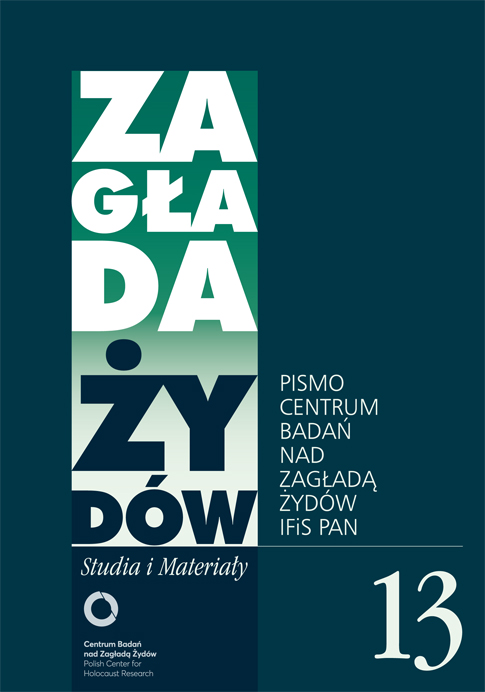Jewish Social Self-help During Operation Reinhardt
Zagłada Żydów. Studia i Materiały, No. 13 (2017), Pages: 276-294
Submission Date: 2020-10-17Publication Date: 2017-12-03
 https://doi.org/10.32927/ZZSiM.360
https://doi.org/10.32927/ZZSiM.360
Abstract
In 1942 the Jewish Social Self-help (Żydowska Samopomoc Społeczna, ŻSS) was the only central Jewish organization in the General Government, with branches in over 300 localities. From the very beginning of Operation Reinhardt the ŻSS Presidium in Cracow had received official letters from the local branches and letters from private persons containing information about “deportations in an unknown direction,” that is, to death camps. This article analyzes the content and language of that correspondence and describes the actions undertaken by the ŻSS Presidium with regard to the collected information. During the first weeks those were attempts to confirm the transports’ destination and negotiations with the German administration of the General Government regarding provision of decent living conditions in the places of ‘resettlement’. Those efforts were discontinued with the gradual advent of the awareness of the extermination. From then on the Presidium concentrated on protecting its own employees from deportation and increasing their number. Moreover, it also encouraged its local branches to establish work co-operatives for artisans, which was thought to enable the employed to avoid deportation. In the end all those efforts came to no avail. The ŻSS continued its activity, in a significantly reduced dimension, under a changed name (Jüdische Unterstützungstelle, JUS) until July 1944.
License
Copyright (c) 2017 Author&"Holocaust Studies and Materials"

This work is licensed under a Creative Commons Attribution 4.0 International License.
https://creativecommons.org/licenses/by/4.0
The journal is published under the Diamond Open Access Standard, CC-BY-4.0 Deed - Attribution 4.0 International - Creative Commons
Most read articles by the same author(s)
- Agnieszka Haska, Aleksandra Bańkowska, Post-War Inhabitants of the Building at Tłomackie Street No. 5 , Zagłada Żydów. Studia i Materiały: No. 8 (2012)
- Aleksandra Bańkowska, Polish Partisan Formations during 1942–1944 in Jewish Testimonies , Zagłada Żydów. Studia i Materiały: No. 1 (2005)
- Aleksandra Bańkowska, Polish Partisan Formations during 1942–1944 in Jewish Testimonies , Zagłada Żydów. Studia i Materiały: 2008: Holocaust Studies and Materials
- Aleksandra Bańkowska, Agnieszka Haska, (“…buried in the Basements of the Enumerated Buildings Are…” The Search for the Ringelblum Archive , Zagłada Żydów. Studia i Materiały: No. 12 (2016)
- Aleksandra Bańkowska, Tatiana Brustin-Berenstein , Zagłada Żydów. Studia i Materiały: No. 7 (2011)
- Aleksandra Bańkowska, Weronika Romanik, The Bialystok Ghetto Underground Archive. The Mersik–Tenenbaum Archive , Zagłada Żydów. Studia i Materiały: No. 9 (2013)
- Aleksandra Bańkowska, Between responsibility and powerlessness, generosity and temptation. Social care workers in the Warsaw ghetto in the face of their charges and petitioners , Zagłada Żydów. Studia i Materiały: No. 20 (2024)
- Maria Ferenc, Aleksandra Bańkowska, “Could there be any moral compensation for the obliteration of all traces of a thousand years of Jewish existence in Poland?” Unknown writings by Emanuel Ringelblum from 1943 , Zagłada Żydów. Studia i Materiały: No. 20 (2024)
- Aleksandra Bańkowska, Sebastian Piątkowski (oprac.), Relacje o pomocy udzielanej Żydom przez Polaków w latach 1939–1945, t. 1–4 [Aleksandra Bańkowska] , Zagłada Żydów. Studia i Materiały: No. 17 (2021)
- Aleksandra Bańkowska, Jan Láníček, Jan Lambertz (eds.), More than Parcels:Wartime Aid for Jews in Nazi Camps and Ghettos , Zagłada Żydów. Studia i Materiały: No. 19 (2023)
Similar Articles
- Gabriel Finder, The Trial of Shepsl Rotholc and the Politics of Retribution in the Aftermath of the Holocaust , Zagłada Żydów. Studia i Materiały: No. 2 (2006)
- Jacek Leociak, Understanding the Holocaust. A Task for Generations , Zagłada Żydów. Studia i Materiały: 2008: Holocaust Studies and Materials
- Dan Michman, Dutch Society and the Jewish Fate: A Puzzling Record , Zagłada Żydów. Studia i Materiały: No. 12 (2016)
- Peter Black, The Sonderdienst in the General Government , Zagłada Żydów. Studia i Materiały: No. 12 (2016)
- Marta Duch-Dyngosz, In Search of Local Memory of the Holocaust. The Case of Commemoration of Jewish Communities in Smaller Towns in Contemporary Poland , Zagłada Żydów. Studia i Materiały: No. 17 (2021)
- Natalia Aleksiun, When Fajga Left Tadeusz. Wartime Relationships of Survivors after the Holocaust , Zagłada Żydów. Studia i Materiały: No. 17 (2021)
- Małgorzata Melchior, The Holocaust and Polish-Jewish Relations in Sociological Studies , Zagłada Żydów. Studia i Materiały: 2008: Holocaust Studies and Materials
- Joanna Śliwa, A reviev: Agnieszka Witkowska-Krych, Dziecko wobec Zagłady. Instytucjonalna opieka nad sierotami w getcie warszawskim , Zagłada Żydów. Studia i Materiały: No. 19 (2023)
- Jakub Chmielewski, Judenrats and the Jewish Order Service in the Kreis Lublin-Land. Structure, staff, activities , Zagłada Żydów. Studia i Materiały: No. 21 (2025)
- Marta Duch-Dyngosz, Magdalena Waligórska, The Boundaries of Collaboration in the Perception of Court Witnesses of the August Trials , Zagłada Żydów. Studia i Materiały: No. 19 (2023)
1 2 3 4 5 6 7 8 9 10 11 12 13 14 15 16 17 18 19 20 21 22 23 24 25 26 27 28 29 30 31 32 33 34 35 36 37 38 39 40 41 42 43 44 45 46 47 48 49 50 > >>
You may also start an advanced similarity search for this article.
 English
English
 Język Polski
Język Polski



 https://orcid.org/0000-0003-1037-0550
https://orcid.org/0000-0003-1037-0550





